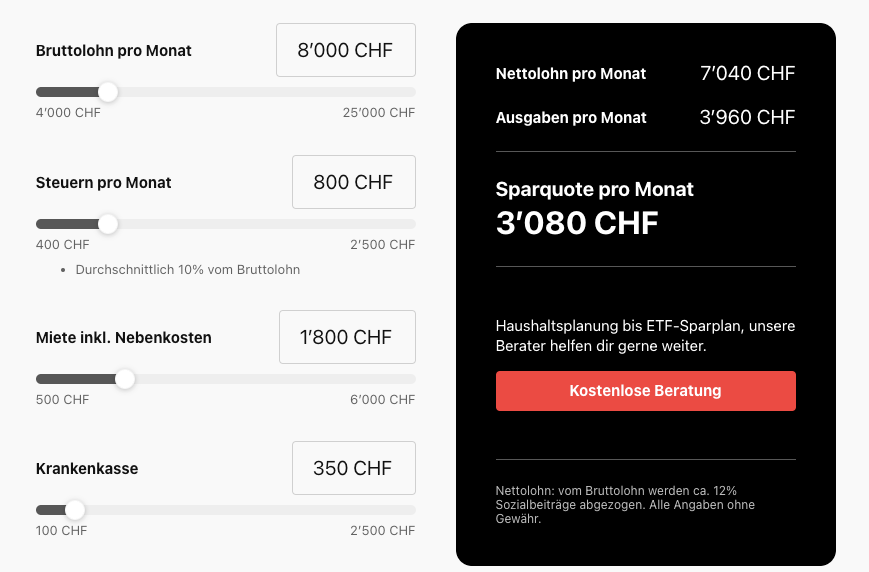Job search in Switzerland
If you want to emigrate to Switzerland, you are in good company: according to the Federal Statistical Office, there were 309,500 German nationals living in Switzerland in 2020. Many of them made the move successfully - with good preparation and the necessary knowledge about entering, staying and living in Switzerland.
Working in Switzerland
Switzerland offers attractive career opportunities, e.g. in the healthcare sector or in technical professions, where there is a noticeable shortage of skilled labour. When looking for a job, there are various recommended job portals that are specifically geared towards the Swiss labour market. If you want to emigrate to Switzerland, you should find out about regional differences, wages and the recognition of qualifications at an early stage - this will increase your chances of a successful career start.
Application to CV: 6 valuable tips
Emigrating to Switzerland: Looking for a job is always a task that requires perseverance and commitment. And landing your dream job abroad can also be overwhelming. Especially if you are not yet familiar with the local customs. But don't worry: in this section, we will show you step by step how to successfully apply for a job in Switzerland and give you valuable tips on how to structure your CV. This will increase your chances of finding your place on the Swiss labour market. Never forget one thing: you have a lot to offer. We will help you to make this clear to the decision-makers.
1. use job platforms
Your new career starts on the internet: Start your search on platforms like jobs.ch or indeed.ch. These platforms are the perfect first port of call for finding open positions. Many companies list their jobs here and you can search specifically for positions and sectors that match your qualifications.
You will find a list of recruitment consultancies at the bottom of the page.
2. submit application documents
You have spotted a suitable position and would now like to apply for it. You can either apply directly via the company website or by email (the job portals usually link directly to this). It is important to ensure that you adhere exactly to the specifications in the job advert. This is because the Swiss (like the Germans) attach great importance to accuracy and also pay close attention to correct behaviour: for them, it is simply good manners to adhere to the specifications. A company often offers an online application form, but sometimes a direct e-mail to the HR department is also requested.
Your application documents should include at least a curriculum vitae (CV) and a letter of application, a so-called "letter of motivation". Important: Although you can use a standard template text, make sure you mention certain special features of the position and the company. For example, if you are applying for an IT position involving the development of cloud solutions for industry, explicitly mention why this sector interests you and why this particular company appeals to you.
3. the perfect curriculum vitae (CV)
Your CV is your business card - and it has to be convincing at first glance. In Switzerland, there are a few unwritten rules about what a CV should look like. Below you will find our most important tips to help you turn your CV into a brilliant advertising poster for yourself.
The length
A CV should not be too long or too short. 6 to 7 pages is too long. Company HR departments are reluctant to wade through excessively long CVs. A one-pager, on the other hand, often compresses too much information onto one page, which can lead to important details being lost. For example, 2 to 3 pages on which you present all relevant information clearly and concisely are ideal.
Bulletpoints
For each position, you should list 2 to 3 bullet points that describe your most important tasks and achievements. The same applies here: pay attention to the length. Too much information (around 8 to 10 bullet points) is counterproductive. Instead, select the really important aspects that are relevant to the new position.
Relevant content
It is important to delete unnecessary details or to formulate them more concisely. Instead of giving general details (e.g. IT skills: Word), you should mention specific skills or interests that offer real added value. Instead of "IT skills: Word" you could write "IT skills: CRM (Salesforce)". Similarly, "Reading" seems more exciting if you specify what exactly you read, such as "Reading - novels by Paulo Coelho". Such precise formulations make the CV more interesting.
Brief profile
If your CV were a film, then the short profile is the trailer for it. It briefly summarises who you are, what you can do and, above all, why you want to move to Switzerland. Place your short profile prominently at the top of your CV. This is your opportunity to show your motivation and give Swiss HR departments the feeling that you are ready and available for an interview. Feel free to explain that you are already in talks with Swiss companies or that you would like to move to Switzerland within three to six months. In this way, you are clearly signalling that you are working intensively on your emigration.
Flexibility and willingness to relocate
An important point for many Swiss employers is your availability. Therefore, make it clear that you are available for an interview at any time and can respond flexibly to possible interview appointments. Also mention in your short profile that you are actively looking for a job in Switzerland and that you are firmly planning to relocate. Employers want to be sure that you are serious and ready to relocate to Switzerland.
Summary
The right layout for your CV is a decisive factor. Keep it short and concise, but informative. Show Swiss employers that you are ready to take the plunge into a new life.
4. follow up if you don't hear anything
Once your documents have been received, give them a little time. However, if you have not heard from the company after two to three weeks, it is completely normal and even advisable to follow up by phone or e-mail. This demonstrates your interest in the position. Simply ask in a friendly manner about the status of your application and emphasise that you are always available to answer any questions. This way you will be remembered and signalise that you are committed.
5. preparation for the job interview
It worked and you have received your appointment for the interview. Hooray! Depending on your position and industry, you'll have two or three interviews, and in different constellations. Each interview will be different, so prepare carefully.
Do your research: Who is talking to you? LinkedIn is your friend here. What influence and function does the person have in the company? Where did they work before? Maybe you have something in common.
Be self-confident - but not too much. Present yourself as an equal and show that you really want the job and that you can add real value to the company. Here, however, we need to discuss an important cultural aspect of (German-speaking) Switzerland: People here are more restrained, you could say "more reserved" than in Germany. So, metaphorically speaking, if you kick down the door of the room and present yourself as God's gift to the company, you're likely to offend. In Germany, people tend to be direct and often relatively blunt, whereas in Switzerland politeness and "not disturbing others" are highly valued. This does not mean that you should play down in an interview. But be careful not to come across as arrogant. Ask questions, let the other person finish, show interest and mention your talents and added value at the appropriate times.
6. dealing with cancellations
When looking for a job, it is a fact that rejections are completely normal, especially if you apply for several jobs at the same time. Depending on the industry and position, it is common to receive five to ten rejections or more before success is realised. Don't let this discourage you. However, if you feel that you are receiving too many rejections, it could be due to your application documents. In this case, it is advisable to have your documents checked by a professional recruitment consultant. This way, you can ensure that you meet the requirements of the Swiss labour market.
Why the Swiss labour market is popular:
- The standard of living in Switzerland is among the highest in the world
- The career opportunities, especially for well-educated expats, are attractive. There is a shortage of skilled labour in many high-wage technical sectors
- The free movement of persons makes it relatively easy for emigrants from Germany to set up a business here
- The cost of living is high by international standards, but this also applies to salaries: the median salary in 2018 was CHF 6,538. However, there are differences depending on the canton and sector
- The Swiss working week comprises 42 hours (with a 100 per cent workload)
- The statutory holiday entitlement is 20 days. Many employers offer 25 days' holiday
- Protection against dismissal is less pronounced than in Germany and is usually based on years of service
The top industries in Switzerland
Switzerland is a country whose economy is largely characterised by the service sector (healthcare, banking, etc.). According to the Federal Statistical Office, its contribution to the country's total economic output in 2021 was an impressive 74 per cent. In contrast, the share of the industrial sector fell from 30 to 25.3 per cent, although this sector did not shrink in absolute terms, but merely grew more slowly than the tertiary sector.
But which sectors are particularly prominent in the service sector? According to various sources, banking and insurance are still among the dominant sectors, even though the banking sector in particular has experienced some setbacks in the recent past.
Switzerland is also one of the leading drivers of innovation in the field of digital technologies. Not only are global heavyweights such as Google and Microsoft based here, but there is also a dynamic start-up culture, which has a perfect breeding ground thanks to the high-calibre universities and colleges. Computer scientists in particular are in high demand in Switzerland. However, employees in the catering and construction sectors are also in high demand.
You want to go to the Emigrate to Switzerland? Register for a free emigration consultation.
Job portals
https://www.medtalents.ch (Health)
https://www.ictcareer.ch (computer science)
https://www.schuljobs.ch (Education)
Recruitment agency
👉 Get in touch for a free consultation: Contact
👉 Budget calculator - How much will Switzerland cost me? Budget calculator
👉 Ready to emigrate? Get the Switzerland checklist: Checklist
👉 You can find more topics relating to your emigration here: Topic overview
👉 Subscribe to our YouTube channel: YouTube
Budget calculator - How much will Switzerland cost me per month?
Emigrating to Switzerland: With our budget calculator, you can realistically estimate your monthly expenses in Switzerland. From rent to health insurance to taxes - the tool calculates your living costs and shows you your savings rate at the end. Ideal for preparing for your emigration to Switzerland.

Counselling team
Our advisory team and office staff specialise in emigrants from Germany and Austria, and we help people emigrate to Switzerland every day. If you would also like to emigrate to Switzerland, please get in touch using the contact form and get to know our team in Zurich - we look forward to hearing from you! 🤗
Do you have any questions?
You want to emigrate to Switzerland? We are here for you. Our consultations are free of charge. You can reach us via the contact form or drop by for a coffee in Zurich.
- Home page
- Deine3a | Job search for emigrants in Switzerland | Emigration Switzerland | Emigration agency
